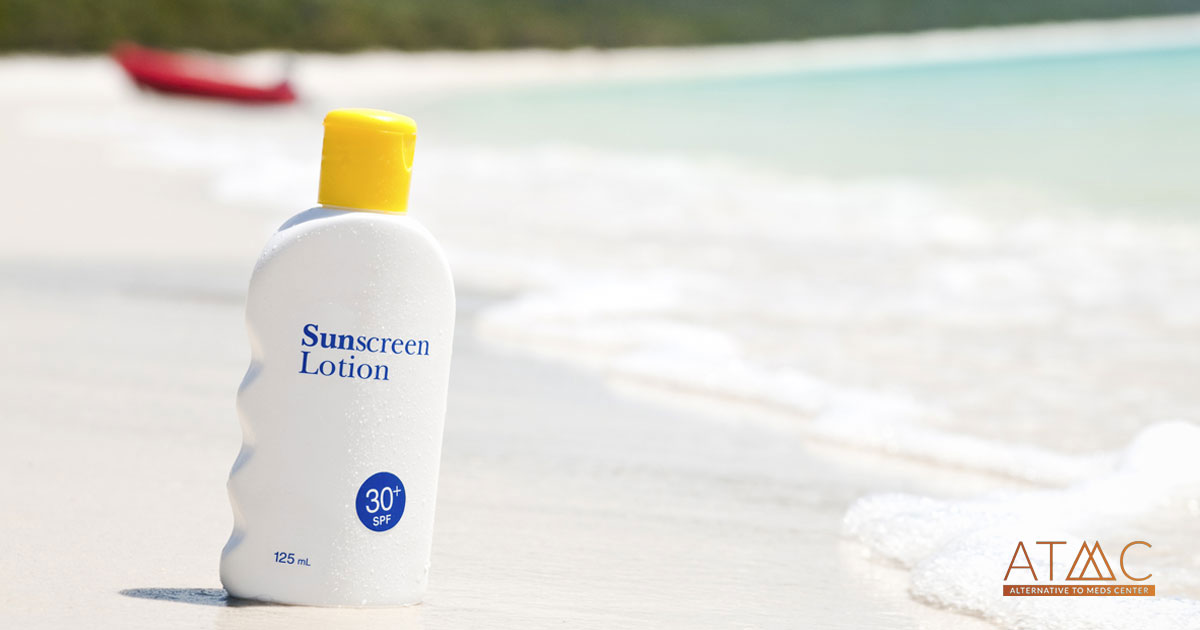Understanding UV and Sunscreen
Many people know that sunscreen is either sprayed or spread onto your skin, which protects you from the sun’s rays. However, there’s more to sunscreen than many realize due to the nature of how these ultraviolet rays – which are a form of radiation – affect the skin. Continued exposure to UV radiation can cause problems ranging from signs of aging like discoloration, loss of skin elasticity, and wrinkles to skin burning, deterioration of the skin barrier, and even damage to the DNA within skin cells. It is this damage and the resulting mutations that can cause the uncontrolled cell growth that leads to cancerous tumor formation.1
While the natural instinct is to assume that continuous use of the strongest UV-blocking sunscreen available is the best protection against skin cancer, research suggests that this may not be the case. As we’ll see, using a certain type of sunscreen, or wearing it daily, can result in other health consequences.
There are two primary types of sunscreen people use to protect their skin: physical sunscreen and chemical sunscreen.
Physical Sunscreen
Also called mineral sunscreen, these sunscreens are spread onto the skin and may leave a white coating after application. These sunscreens must list zinc oxide or titanium oxide as ingredients, according to the FDA. They work by resting atop the skin and reflecting UV radiation back away from the wearer, physically preventing sun damage like premature aging and skin cancers.
Chemical Sunscreen
These sunscreens are sprayed or rubbed onto the skin and become mostly invisible moments after applying. This is because they are absorbed into the skin, where they can then absorb UV rays and force them to dissipate from the body. Active ingredients in chemical sunscreens include oxybenzone, octinoxate, homosalate, and avobenzone.
While both types of sunscreen have been tested frequently by organizations such as the Food and Drug Administration (FDA), the nature of chemical sunscreens has many people concerned. Absorbing chemicals into the skin has the potential to be a concern no matter the personal product, especially since many chemicals found in personal products can accumulate to toxic levels when used frequently. In addition, chemical sunscreens are typically broad-spectrum, which means they contain multiple chemicals to protect the body from UV rays at multiple different wavelengths as well as various artificial fragrances, preservative ingredients, and even dyes.
What Is the Most Harmful Chemical in Sunscreen?
The concern over sunscreen was highly publicized in the early 2020s and reached its height with the FDA-mandated recall of several spray sunscreen products containing benzene. According to the FDA report, benzene is a known carcinogen. It is also highly flammable and is a byproduct found in gasoline, oil, and cigarette smoke.2 Benzene is also incorporated into plastic products, lubricants, dyes, pesticides, and more.
It’s important to note that benzene is not an active ingredient in sunscreen, and companies state that it may have contaminated sunscreen during the manufacturing process. However, in May of 2021, Valisure released a report claiming that more than 75% of sunscreens on the market contained benzene.3
Other Chemicals in Sunscreen
Benzene is far from the only chemical of concern. Other chemicals regularly contained in spray and lotion-based chemical sunscreen products may include 4 :
- Avobenzone
- Ecamsule
- Octocrylene
- Oxybenzone
In 2019, a study showed that the above chemicals were found in participants’ blood toxicology within a day and remained there for up to four days. When the products were applied daily, acceptable levels of these chemicals surged past the FDA’s recommended guidelines. Studies suggest that some of these chemicals, especially oxybenzone, appear to affect hormone function in humans by either mimicking or blocking certain hormones like testosterone and thyroid hormone.
Researchers noticed an association between thyroid function, testosterone levels, kidney function, puberty, and perhaps even cancers that warrant more research.5 In addition, these chemicals have had a marked negative effect on marine life, causing hormone disruption, oxidative stress (cell damage), and inflammation.6
A Note About FDA Regulations
While the FDA evaluates the safety of chemical sunscreens, it continues to assert that the benefits of sunscreen outweigh the risks. However, it’s natural to be concerned about any chemical ingredient you are absorbing through the skin. Sunscreen is considered an over-the-counter (OTC) drug that is designed to prevent sunburn, reduce the odds of skin cancer, and reduce early skin aging, and the FDA is charged with determining which ingredients are safe and effective. If the ingredients are considered safe by the FDA, sunscreen can be manufactured without the individual approval of each formulation.
Should the FDA provide new guidelines about sunscreen, this could drastically change how sunscreen is marketed, sold, and manufactured. An update on FDA sunscreen regulations will cause discourse among consumers, with the goal of reducing exposure to harmful chemicals.
Is All Sunscreen Bad?
After understanding the potential health consequences of certain chemicals contained in sunscreen, you may wonder, “Is sunscreen bad for you?” The answer to that question is a complex one. Some chemical sunscreens don’t contain the most concerning chemicals, meaning they may be safer to use than others; however, a large number of seemingly “safe” sunscreens that are benzene- and oxybenzone-free still contain fragrances, dyes, and preservatives. As mentioned, these chemicals applied to the skin on a daily basis may be cause for concern.
Keep in mind, too, that even physical sunscreens that don’t rely on chemical absorption could be concerning if used daily. Let’s explore how absorption works, why chemicals can be an issue, and why sunscreen is concerning if used on a daily basis.
How Chemical Absorption Works
Chemicals, whether those in personal products directly applied to the skin or those you are exposed to incidentally via the environment, can be absorbed through the skin. Though the skin’s chief purpose is to provide a barrier against the environment, it is naturally a porous organ so you can absorb nutrients and excrete waste through sweat. It is this permeability that puts you at risk of absorbing unwanted chemicals.
Chemicals small enough to be absorbed through the skin’s permeable membrane – chemicals known as nanoparticles – can eventually be absorbed through all layers of the skin and into the bloodstream. While the chemicals in chemical sunscreen must be absorbed to be effective, once they enter the bloodstream, they are free to interact with cells all over the body. Many chemicals are proven to be toxic to cells in the body and when allowed to build up over time, can cause severe issues if holistic detoxification does not occur.
Why You Shouldn’t Wear Sunscreen Every Day
If you were to use sunscreen every day, your body would continuously absorb any chemicals it contains, potentially much faster than your body can filter and excrete them. Even if you avoid the most harmful chemicals like benzene and oxybenzone, you may still be absorbing chemical preservatives, fragrances, and more. Rather than constantly absorbing chemicals through your skin, it may be wiser to keep your sunscreen use for times you will be exposed to significant UV rays.
For example, using sunscreen that doesn’t contain the most concerning chemicals on a bright and sunny day at the beach should be okay. However, using sunscreen on a daily basis may still be problematic.
When wearing sunscreen every day, you risk:
- Reduced vitamin D
- Excess chemical absorption
- Fewer endorphins
- Long-term skin irritation
While UV rays have negative effects on cells, they do trigger the body to produce vitamin D and “feel-good” hormones called endorphins. Vitamin D helps the body absorb calcium and phosphorus, which strengthens the bones. Along with endorphins, it can also improve overall mood. Interestingly, the type of vitamin D produced endogenously (by the body) versus taken as a supplement as well as the radiation caused by UV rays itself, may positively affect immunity.7
Applying sunscreen on a continuous basis could affect your ability to access these benefits. Most experts recommend getting at least 30 minutes of midday sun so your body can produce adequate vitamin D, though that number is higher during the winter when sun exposure is weak. However, it is still recommended that you use a safe sunscreen whenever you intend to be out in the sun for extended periods to protect your skin.
What Sunscreen Is Safe to Use?
If you still wish to use sunscreen at various times, not daily, there are some sunscreens on the market you should avoid.
First, it’s crucial to avoid any chemical sunscreens containing known harmful chemicals. Anything containing benzene and oxybenzone should be avoided, as should those containing dyes, perfumes, and preservatives. Using these sunscreens frequently increases your absorption of these chemicals and increases your risk. Also, you may want to avoid aerosol sunscreens, which contain additional propellants and can easily be inhaled by accident.
Physical sunscreens containing zinc oxide or titanium oxide are meant to sit atop the skin instead of being absorbed and are preferred for that reason. Look for physical sunscreens labeled “broad spectrum,” meaning they have both UVA and UVB protection. However, you should still refrain from daily use of zinc-based sunscreens, as the sun itself can provide natural health benefits that sunscreen can block.
Sunscreen for Kids vs. Adults
A child’s skin is much more sensitive than an adult’s, and many pediatricians recommend physical sunscreens for children. This is because of the inhalation risk mentioned earlier, as well as the increased risk of skin irritation from the chemicals in a chemical sunscreen. While some dermatologists believe chemical sunscreens are fine for adult use, they may contain chemicals that can do more harm than good, especially in children.
Sun Protection Without Sunscreen
Fortunately, sunscreen isn’t the only strategy to protect yourself against the sun’s rays if you plan to be outside for an extended period of time.
For example, you can wear sun-protective clothing while in direct sunlight. Clothing and accessories such as sunglasses, wide-brimmed hats, lightweight and long-sleeved shirts, and pants can protect your skin from the sun’s UV rays. Children and adults should wear a physical sunscreen on any exposed areas if the exposure period will be longer than the recommended daylight exposure time.
Of course, you can also avoid direct sunlight entirely by sitting in the shade. When the sun is at its most aggressive point, you can either stay indoors or remain in the shade. In fact, you can still absorb some vitamin D in the shade, so if you want to spend a few minutes in the sun, then head to the shade, you’ll still gain natural benefits from the sun.
Should I Be Worried About Sunscreen?
It’s common for people to recommend sunscreen when you spend any amount of time outside. It’s also common to worry about the potential dangers of sunscreen. Fortunately, not all sunscreen contains the harmful toxins that can result in dangerous side effects.
While no physician would recommend spending significant time in the sun without any protection, a little bit of sunlight every day won’t do you harm and can benefit your health in multiple ways. For those times you need protection from the sun, using sunscreens that contain toxins can result in unwanted chemical exposure and potential side effects. Instead, consider physical sun protection like mineral sunscreens, UV protective clothing, and staying in the shade.
Alternative to Meds Center for Neurotoxin Removal and Detox Services
Alternative to Meds Center is a leader in assessing the ways toxins and chemicals can impact the body and mind and helping individuals recover from toxic exposure. While sunscreen may seem like nothing to worry about at first, and some sunscreens that are zinc-based are fine for infrequent use, others contain toxins that can result in a variety of health conditions.
Rather than prioritizing a substance that can be potentially harmful, we recommend employing other strategies to avoid direct sunlight. In addition, due to the benefits a small amount of sun exposure can have, constant use of sunscreen is rarely warranted. The sun is a natural source of health benefits – just be cautious and experience it in moderation.
If you’ve been exposed to chemicals, whether in your environment, the products you use, or in street or pharmaceutical drugs, Alternative to Meds Center can help. We offer neurotoxin removal and detox services that remove these toxins from the body and focus on holistic, healthier solutions. With discourse surrounding the efficacy of sunscreen and research by the FDA currently underway, now is an ideal time to focus on alternative solutions to protect yourself from skin damage.













